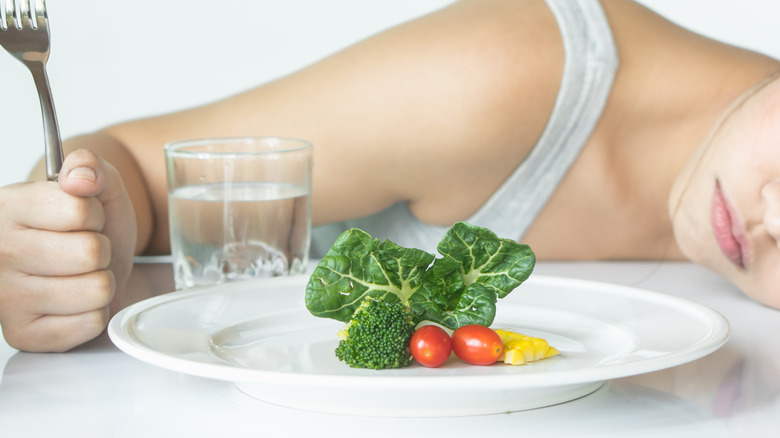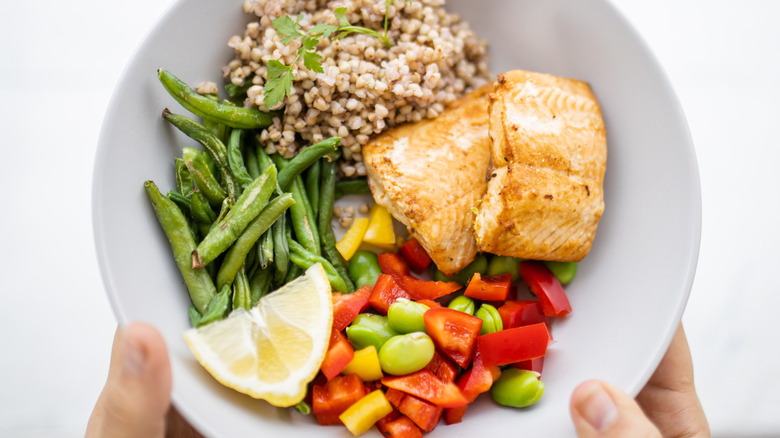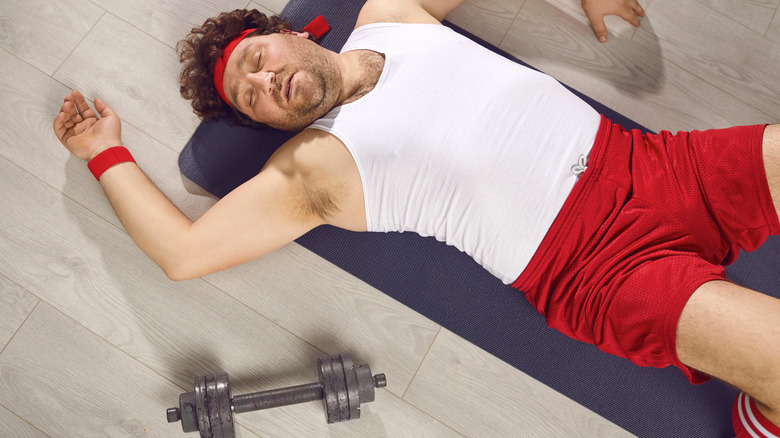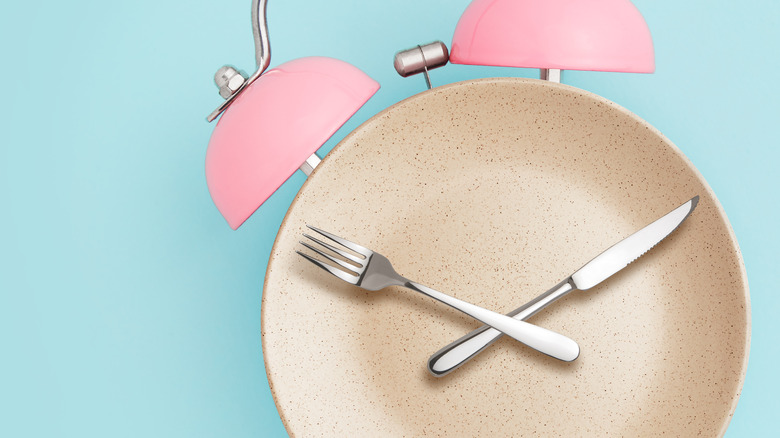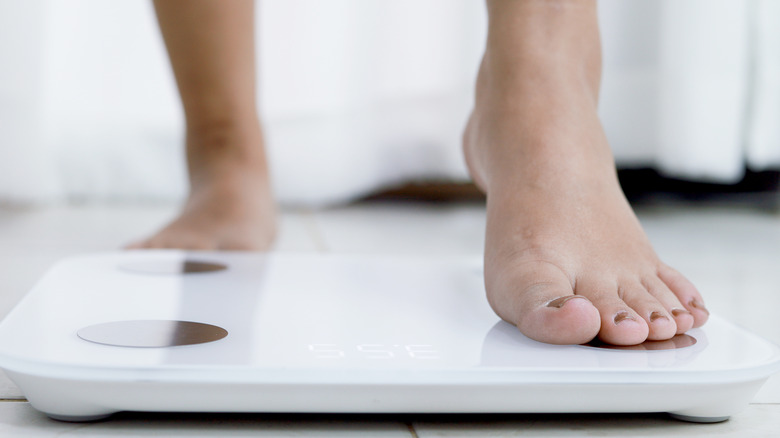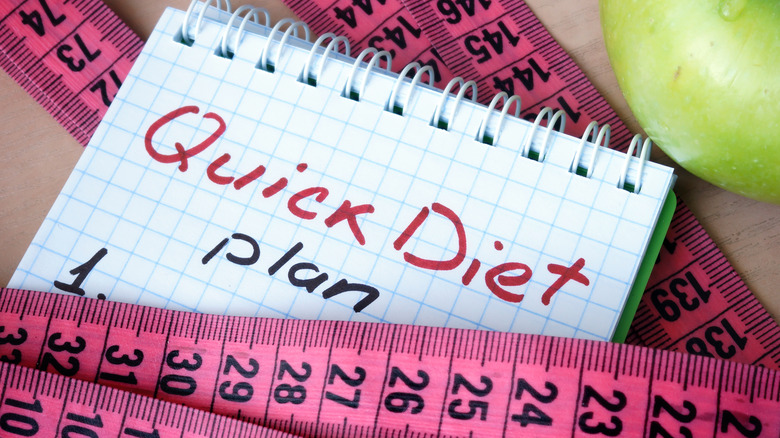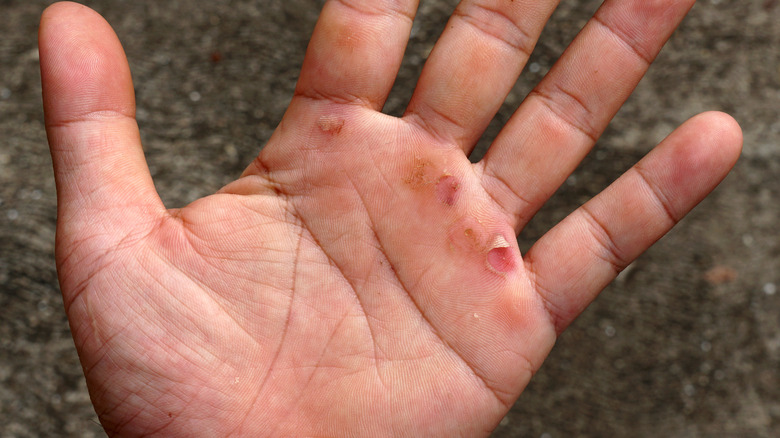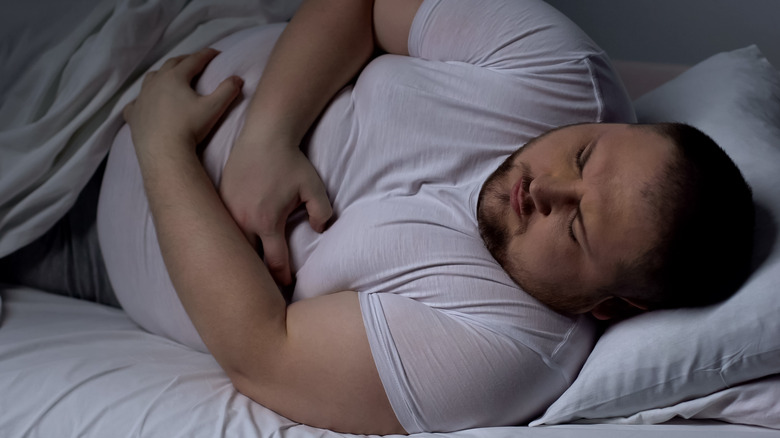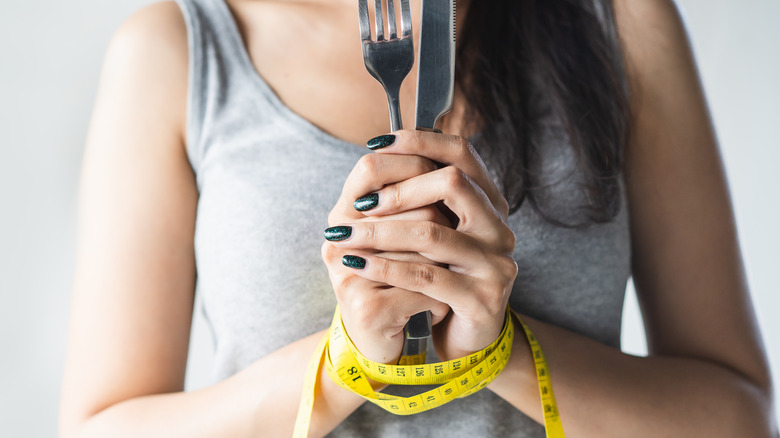14 Signs Your Diet Is Doing More Harm Than Good
The best diet you can put yourself on is one that's healthy and balanced, according to the USDA's Dietary Guidelines for Americans. Even if you are on a diet designed to help you lose weight, it should still include the right mix of vitamins, minerals, and nutrients you need to keep your bodily processes functioning properly.
The Dietary Guidelines say that although recommendations have changed slightly over time, many of them remain consistent, including eating and drinking nutrient-dense foods and drinks, getting a variety of vegetables from all colors of the rainbow into your diet, and making at least half of your daily grains whole grains. The CDC adds that healthy eating also means incorporating the foods you love most so that you don't feel deprived. So, if you want an occasional fast food burger, you can indulge once in a while.
But just like how binge eating can result in serious health problems, dieting also can. Here are some of the risk factors and warning signs of a diet that's doing you more harm than good.
It eliminates food groups you need
What's one of the first things you might think about doing if you find out that you're prediabetic? You might decide to eat super low-carb or cut them out altogether, since carbohydrates can increase blood sugar. However, as the American Diabetes Association says, it's most important to consider the type of carbs you eat. Unprocessed, whole carbohydrates are dense in nutrients and won't impact your blood sugar as much, but they'll still give you the fiber you need in your diet. Registered dietitian Keri Gans tells Women's Health, "I would never tell anyone to eliminate an entire food group, especially carbs. These are our body's fuel. Our brain only functions on glucose, and carbs break down into glucose."
In fact, it's important to include all the food groups — vegetables, fruits, grains, dairy, protein, and oils/fats — in your diet, if possible. The USDA's Dietary Guidelines states that the food groups, together, create a balanced diet that helps your body function at its best. The key is to include nutrient-dense foods and drinks that fall within the categories and help you stay within your calorie limits. For instance, dairy doesn't need to be off limits, but switching to low-fat or fat-free options can reduce fat and calories.
You're not nourishing your body
Nutrient deficiency happens when you aren't getting enough nutrients like vitamins, minerals, or protein in your diet. It's possible for you to become deficient in much-needed nutrients if you cut out a food group or don't eat enough foods from that food group.
Nutrient deficiency is also known as malnutrition, and the reason it sounds scary is because it can be. According to the NHS, malnutrition can lead to excessive tiredness or weakness, unintentional weight loss, and problems with your immune system that can result in taking a long time to heal. Malnutrition can also cause symptoms like bone pain, burning sensations in your feet, or irregular heartbeats (per Rush University Medical Center).
If you notice any of these symptoms, you should probably look to your diet. Make sure you're eating plenty of vegetables, not skipping meals, and eating whole foods rather than processed foods. Always stay hydrated with water throughout the day, as it's necessary for nutrient transportation. Your doctor might also be able to help you fill in any gaps that your new diet could be causing with supplements, if necessary (via CareCredit).
It's difficult for you to follow
Some diets — especially fad diets — offer confusing advice that may not even be evidence-based. Others require you to make significant changes to your diet in a small amount of time, which can leave you feeling overwhelmed and unsure of what steps to take next. Diets that leave you feeling more stressed than anything else probably won't be something you stick with, therefore defeating the purpose of the diet (via the University of Texas MD Anderson Cancer Center).
A diet may also be ineffective if it doesn't fit into your lifestyle well. For example, if your diet asks you to eat at specific times or during a period of a few hours each day and you can't meet that requirement because of your work or personal responsibilities, you'll always feel like you're failing. Registered dietitian Jessica Cording says that eating at specific times isn't necessary, but having some consistency is. "When you don't have much consistency, you can get caught off-guard by hunger and then reach for whatever is around," she explains (via Women's Health). "That can lead to you making less healthy decisions and overeating." So, fitting your meals and snacks into your lifestyle may help you achieve your desired results.
You feel restricted in what you can eat
Your diet may not have long-term results if it's not something you feel like you can live with, because you're giving up all of your favorites. As registered dietitian Andrea Giancoli explains to U.S. News, "[Dieting will] always going to be hard at first, but you're more likely to be able to live with some diets than you are others. You don't want something that's immediately setting you up for failure." Brittney Bearden, also a registered dietitian, adds that diets with a lot of rules and time limits often become more difficult to follow because they can feel restrictive and may not fit the needs of the person using them.
The Mayo Clinic Diet is an example of a diet that includes both a restrictive and non-restrictive portion. The initial Lose It! phase focuses on quick weight loss for two weeks by adding healthy eating habits and removing unhealthy eating habits. The non-restrictive Live It! phase is a longer-term solution incorporating physical activity, healthy foods, and menu planning. Registered dietitian nutritionist Jackie Newgent tells Forbes that overall, the Mayo Clinic Diet can be a great choice, but she only recommends following the Live It! phase for the best, long-lasting results.
It doesn't encourage you to drink water
Staying hydrated is an important part of any diet. "Water intake is thought to aid weight loss by increasing fat metabolism and decreasing feeding," Dr. Chirag Shah, a board-certified emergency medicine physician, tells Healthline. Celebrity chef Devin Alexander adds, "It's very easy to mistake thirst for hunger. I know when I'm not drinking enough, I definitely want to eat more. Also, water legitimately fills you up. So if you drink a lot of water between meals, you'll likely feel fuller faster."
If your diet plan doesn't drive home the importance of water, then it may not be as helpful as you thought. This is especially true if you're following a diet that may require even more water than usual. For example, a high-protein diet can flush out water more quickly than other diets, as the body uses water to flush out excess nitrogen from protein. The Keto diet can also encourage water to leave the body, resulting from cutting carbohydrates (via Everyday Health).
You don't lose any weight, especially at first
Many people start a diet to lose weight. But even if weight loss isn't your goal, you probably will lose at least some weight in the beginning phase of your diet. According to Healthline, this initial period of weight loss is normal. It happens when the body gets rid of extra water weight as you burn more calories than you consume and release excess glycogen through water loss.
After that, Healthline says that you should begin losing weight at a steadier pace of 1-2 pounds per week if your diet goes according to plan. When you don't see any changes, some tweaks to your diet may help. Registered dietitian nutritionist Bonnie Taub-Dix (via Better by Today) says that not eating enough calories could actually hinder weight loss by causing the body to slow metabolism. Taub-Dix also names monotonous diet routines, not getting enough physical activity, and avoiding foods or food groups as reasons your weight loss could plateau or not happen at all.
You lose weight extremely fast
On the other hand, losing weight rapidly may not be a sign of a healthy, effective diet, either. Losing 1-2 pounds per week is the usual recommendation for healthy weight loss (via the Mayo Clinic). At this rate, it's likelier that you'll maintain your weight loss long-term. If you choose to lose weight faster than this, you may need medical supervision to make sure you aren't harming your body. One potential problem with losing weight too quickly is that you could risk losing lean muscle tissue instead of fat (via Livestrong).
Dr. Gerardo Miranda-Comas explains via Men's Health that muscles are necessary for bodily functions and proper movements. "With loss of muscle mass, strength and endurance are affected negatively, leading to decreased functional performance," says Miranda-Comas. If you eat too few calories to lose weight, you could be successful — but that weight loss might be in the form of muscle rather than fat. Miranda-Comas says that a key indicator that you're losing more muscle than fat is lacking energy during the day, as decreased muscle can result in energy deficiency.
Your overall health isn't improving
A healthy diet should do more for you than help you lose weight. In fact, dieting the right way can have many health benefits that you may not have even been looking for. For example, you could boost your heart health and build muscle throughout your body by having a diet combined with muscle-building exercise (via Healthline).
Even without weight loss, diets have proved to benefit overall health. One study (via the JAMA Network) studied the effects of a high-carb diet, a high-protein diet, and a low-fat diet on adults with prehypertension or stage 1 hypertension. Researchers kept the participants' caloric intake at neutral to avoid weight gain or loss. At the end of the diet period, the participants using any of these diets experienced a decrease in LDL cholesterol and blood pressure. Also, those following a low-fat diet saw a notable decrease in triglycerides.
According to Kathy McManus, Director of the Department of Nutrition at Harvard Medical School, cutting down on sodium and incorporating more healthy fats and protein into your diet are excellent ways to improve your health, even if you're not looking to lose weight.
You feel more tired than usual
Have you recently switched to a cleaner diet filled with whole foods and lots of vegetables and fruit? That's great, except if you're not incorporating enough calories or nutrients into your diet, your energy could suffer.
This can happen for a few reasons. Registered dietician Elizabeth DeRobertis tells CNN that reducing calories too much can leave you feeling sleepy or lacking energy overall. Your body needs calories for energy, so cutting them significantly can make you sluggish. DeRobertis also warns that cutting out too many carbohydrates from your diet can have a similar effect. When your carb intake is too low, you end up losing water, DeRobertis explains. If you're not replenishing your body with enough water, fatigue can set in.
If you're experiencing tiredness that interferes with your day, it could be a good idea to check with your doctor or dietitian to determine what dietary changes you can make to perk your energy back up.
Your mood suffers
A diet should not only improve your physical health, but it could also improve your mental health. At the very least, it should not make your mood suffer.
Healthy diets can result in healthy guts. When the gut is happy, our brains usually are too, as evidence shows strong links between the two. That's why, if your diet contains a lot of sugary and processed foods, you might end up feeling satisfied at first, but later experience a down period of stress, anxiety, or an overall bad mood. On the other hand, your body and gut crave lean proteins, complex carbohydrates, and fatty acids, so eating more of those leads to a healthy gut and, therefore, a healthier brain and nervous system (via Sutter Health).
A 2019 scientific review published in Psychiatry Research found that ketogenic, Paleo, DASH, vegetable-based, and glycemic-load-based diets were among the best for improving mood in research participants.
Your body doesn't heal quickly
Have you noticed that wounds take longer to heal after changing your diet? It could be because your diet doesn't offer the nutrients you need for your immune system to do its best.
According to the Cleveland Clinic, vitamin and mineral deficiencies can affect the way your body heals wounds. When you have a wound, getting enough protein is especially important, but making sure you're eating enough calories is also necessary for the healing process.
Your body also needs proper nutrition to fight off infections, colds, and illnesses. The Harvard T.H. Chan School of Public Health says that a balanced diet combined with an active and healthy lifestyle are two crucial factors for a reliable immune system. Highly processed foods or diets with limited variety in nutrients or ingredients can affect the immune system's ability to do everything it needs to do. Adding probiotics, prebiotics, or vitamin supplements to a diet lacking certain nutrients could be beneficial for immunity, but be sure to check with your doc before making any alterations.
Your diet focuses only on eating and not on lifestyle
Pediatric nursing professional Julee Waldrop writes in The Journal for Nurse Practitioners that exercise is an important part of an overall healthy lifestyle, and may offer more benefits when combined with a balanced diet than the diet by itself. "We have solid scientific proof that participating in 150 minutes of moderate physical activity a week (along with muscle strengthening activities at least twice a week) can reduce blood pressure and cholesterol leading to a decreased risk of cardiovascular disease," Waldrop explains. It can also decrease the risk of type 2 diabetes and metabolic syndrome."
Physical activity and diet go hand-in-hand with a healthy lifestyle. If your diet focuses only on eating and not moving more, you might find yourself stuck in a plateau. According to the Better Health Channel, a good goal is to incorporate physical activity into almost all or all days of the week, and aim for 30 minutes each day you exercise. Doing so could reduce your risk of falls, help you lose weight, and build a stronger skeletal and muscular system.
You're having tummy troubles
Are you feeling constipated, bloated, or like you have an angry belly after making healthier diet changes? You're not alone. Tummy troubles can be common symptoms of healthier eating. "When people start eating healthier, which usually means more vegetables and possibly swapping refined grains for whole grains, they sometimes find they're getting stomach upset," Tamara Duker Freuman, a registered dietitian, explains to My Fitness Pal. "That might include bloating, feeling overfull, even nausea in some cases." Fortunately, she adds that the changes are usually temporary.
Freuman also writes in a U.S. News article some other possible causes of your belly pains when you change your diet. One reason is that your diet is heavier on insoluble fiber (which doesn't help bulk stool) than soluble fiber (which bulks and softens stool), leading to constipation or painful bowel movements. Cutting down on fat could also harm your digestive tract, as fat's necessary for regular bowel movements. Freuman suggests ensuring that healthy fats exist in your diet, like fatty fish, nut butters, and avocado.
It's becoming an obsession
Healthy eating is one thing, but obsessive eating can take over your life in a very unhealthy way. Registered dietitian Jennifer Culbert writes in a BU Today article that orthorexia is a form of obsessive eating that focuses on the quality of food. While people wth anorexia focus on how much food they eat, people with orthorexia might have extreme aversions to foods containing sugar or sodium.
As we know, eating too much sugar, sodium, fats, and other potentially dangerous ingredients and nutrients can be harmful to your health. However, orthorexics become so laser-focused on healthy eating that they could leave important food groups out for fear that they'll hinder their diet. According to Culbert, "They cut out meat because they heard that meat is bad, then they cut out dairy because they think it's fattening, and then they move on to anything that's processed. But processed foods aren't necessarily bad; for example, brown rice, whole-wheat pasta, and whole-wheat bread are actually all processed foods."
Culbert adds that virtually any diet could risk turning into orthorexia. She suggests creating healthy eating patterns by ensuring that meals contain a lean protein, non-starchy fruit or vegetable, and a serving of whole grains.

